In the ever-evolving travel industry landscape, the seamless integration of global accommodation providers is pivotal. OTAs, hotel booking platforms, and other travel businesses need real-time access to extensive hotel inventories to offer diverse choices to their customers. Hotelbeds, a leading accommodation wholesaler, provides this expansive inventory and advanced tech solutions, making it a top choice for many.
This article delves into the core of Hotelbeds, its offerings, and a step-by-step guide, including our experience working with its APIs.
What is Hotelbeds: Key things to know
Hotelbeds is the largest bed bank in the hospitality sector that provides an extensive listing of accommodations and other travel offerings worldwide. As a bed bank, it operates in the B2B realm, procuring rooms from accommodation providers in bulk at discounted rates and then offering them to various businesses like OTAs, travel agents, and airlines.
With the strategic acquisition of Tourico Holidays and GTA wholesalers, Hotelbeds expanded its portfolio to encompass over 300,000 hotels across 200 destination countries. To break it down, there are roughly 85,000 properties in the Americas, nearly 143,500 in Europe and the Middle East, and approximately 71,500 accommodations in Asia Pacific regions.
For hoteliers, Hotelbeds serves as a bridge to a vast network of over 71,000 travel buyers spanning more than 150 source markets globally.
At AltexSoft, we've worked with Hotelbeds' API across several projects, assimilating insights and expertise in the process. This expertise ranges from direct interactions with the API to leveraging third-party providers, offering us a broad perspective on integration possibilities. Throughout this guide, we'll share our key findings on this matter.
Read more about various travel APIs in our dedicated article.
Accommodation
Hotelbeds has diverse inventory offerings from traditional hotels to alternative accommodations. Whether someone is looking for a luxury experience, a family-friendly environment, or a budget stay, they can find a suitable place since the range includes it all
- hotels,
- resorts,
- boutique hotels,
- hostels,
- apartments,
- homes/villas,
- B&Bs, and
- aparthotels.
Also, hotel profiles are tagged to make the selection process even more user-friendly. These tags, such as "best for beach" or "luxury," guide users to find options best suited to their preferences. For instance, resellers sourcing the inventory can directly look for hotels with the "best for sightseeing" tag.
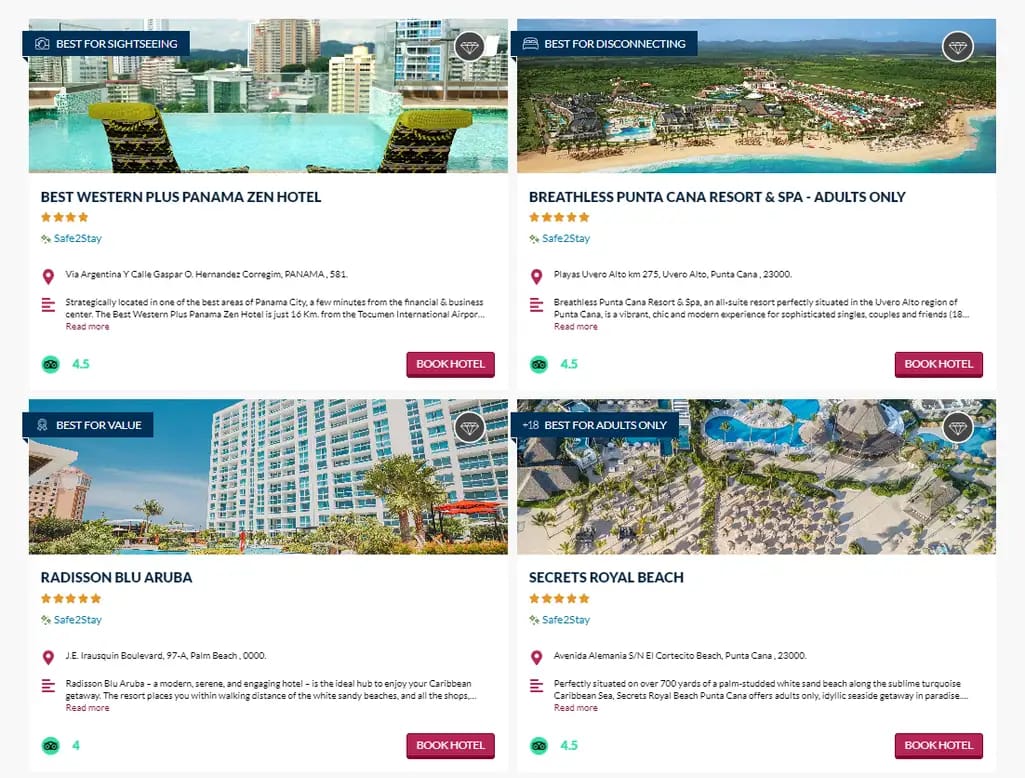
Hotel descriptions with tags to help agents with the choice. Source: Hotelbeds
Furthermore, Hotelbeds has partnerships with several big hotel brands, solidifying its status in the hotel industry. Some of these renowned names include IHG, Hilton, Sheraton, and Hyatt.
Other travel inventory
Understanding travelers seek more than accommodations, Hotelbeds offers an extensive "Beyond the bed" portfolio.
- Tours and attractions: 18,000+ activities spanning 680 destinations in 200 countries. The offerings are vast, from iconic experiences like the City Sightseeing hop-on-hop-off bus tours to attractions like Legoland Windsor Resort.
- Transfers: Ensuring seamless commutes with 24,000+ transfer options, both private and shared.
- Car rentals: Collaborating with 500+ suppliers in over 170 countries, including big names like Goldcar and Hertz.
Connectivity solutions
Hotelbeds offers APItude, a suite of application programming interfaces (APIs) designed specifically for connectivity in the hotel distribution sector.
If you're new to the concept of APIs, we recommend checking out our technical explainer article or watching the brief video below for an overview of their role in the travel sector.
https://www.youtube.com/watch?v=oMCrdM_ClAU&ab_channel=AltexSoft
Returning to Hotelbeds APItude, this suite grants instant access to a network of approximately 250,000 hotels. Created to serve Hotelbeds Group clients, the APItude Hotel API suite encompasses a range of RESTful APIs to integrate Hotelbeds inventory into travel projects.
Key use cases of APItude include:
- Platform development: Suitable for integrating hotel websites and mobile applications, ensuring real-time content updates.
- Integration capabilities: Facilitates integration with various platforms internally within an organization and externally with other services.
- Content consolidation: Enables users to centralize accommodation data within a singular Content Management System (CMS), which might streamline product management and distribution processes.
Hotelbeds also collaborates with other connectivity solution providers such as SiteMinder, e-GDS, and HotelRunner. These partnerships aim to maintain the currency and comprehensiveness of Hotelbeds' data. Hotelbeds also offers APIs that cater to activities and transfers. Alternative methods like website bookings, widgets, and white-label solutions are available for those not looking for direct API integration.
Core components and functionalities of the Hotelbeds APItude
APItude is Hotelbeds' main API suite, providing a range of functionalities designed to cater to hotel distribution and management needs.
The suite comprises three primary APIs for hotels, activities, and transfers:
- Booking API to manage reservation data and the hotel booking process, handle reservations and bookings for various activities, and oversee data and processes related to transfer reservations
- Content API to provide static and dynamic information related to hotels, offer details about different activities, and deliver data on available transfer options
- Cache API to present snapshots of pricing and availability for hotels, activities, and transfers, specially optimized for high-traffic platforms
As we advance through this section, we'll examine each API more in-depth, highlighting their unique functionalities and how they cater to their respective sectors.
APItude hotel APIs
Hotel Booking API. The Hotel Booking API is a central component within the Hotelbeds API framework. This API encompasses the entire booking workflow, enabling real-time hotel reservations, often in as few as two steps. Its functionalities range from generating hotel lists and confirming bookings to managing cancellations and modifications and retrieving detailed booking information.
The API is versatile especially in combination with the Hotel Content API to fetch hotel content data. This synergy provides enriched details such as images, descriptions, facilities, and more, allowing a full-fledged view of each accommodation.
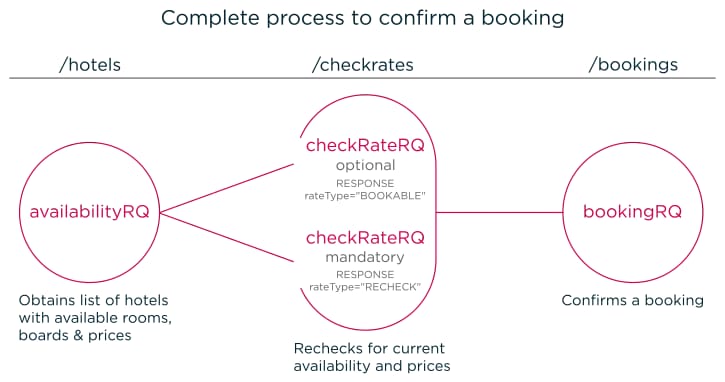
Booking API methods
Hotel booking API includes the following methods.
- /hotels: Primarily used for room availability inquiries. This method offers advanced filters and a flexible-date search option. The API provides a comprehensive list of hotels detailing room types, board variations, and rate lists. Additionally, it includes all financial information — prices are conclusive, with no hidden charges, and potential cancellation fees are clearly displayed.
- /checkrates: While most hotels offer two-step bookings, certain ones necessitate a refresh for current availability and pricing. This method grants this, additionally showing upselling options, distinguishing the difference in requested rates and the upselling rates presented.
- /bookings: A multifaceted method catering to various needs, including confirming bookings, retrieving lists of all bookings, fetching specific booking details, amending an existing booking, processing booking cancellations, or simulating them to understand the cancellation terms.
In the realm of the APItude Hotel suite, data interactions are facilitated through HTTPS protocols, encompassing POST, GET, PUT, and DELETE requests. Both XML and JSON formats are supported, though JSON is preferred due to its standardized structure. This flexibility ensures seamless request construction and response parsing, leveraging tools available in many popular programming languages.
Hotel Content API. The Hotel Content API serves as a reservoir of static hotel data, complementing the dynamic info offered by the Hotel Booking API. Understanding the content fetched by APItude requires categorization into two main branches:
- Static information refers to data not directly linked to the booking procedure. It covers comments, descriptions, illuminative hotel pictures, and location details.
- Dynamic information is directly associated with booking actions; this data is more fluid, representing real-time changes. Examples include prices, date-specific availability, cancellation policies, and associated fees.
Users obtain a comprehensive perspective of hotel offerings by combining static and dynamic information. This ensures all details, whether permanent or fluctuating, are plainly available to users.
Hotel Cache API. Hotelbeds' Cache API caters to users and businesses looking for extensive data access, ideal for third-party platform uploads or package travel creation.
The system provides access to the Hotelbeds Databank, allowing you to:
- view updated prices and inventory details on demand,
- develop dynamic package content,
- present accurate offerings,
- showcase immediate precalculated availability on your website, and
- manage your inventory cache.
Leveraging the Cache API allows businesses to expand their reach and ensures they remain updated with the latest data from Hotelbeds, enhancing user experience and confidence.
APItude activities APIs
Hotelbeds also expands its APItude suite to include features related to activity bookings. This enhancement provides users with the ability to check availability for tickets and excursions across various platforms, including desktop, mobile, and tablets.
The suite of Hotelbeds APIs for activities encompasses Activities Booking API, Activities Contents API, and Activities Cache API.
Activities Booking API oversees the real-time listing of activities, adjusting the output based on user-defined filters. Beyond mere listings, it ensures users get accurate availability data for specific activity codes and their respective operational dates. Once the booking stage is reached, this API becomes indispensable. It's at the helm of several critical processes: from confirming bookings to handling modifications and cancellations.
Activities Contents API delivers auxiliary data encompassing geographic aspects like countries and destinations. Furthermore, this API presents comprehensive information when users seek specifics about an activity. From vivid images that capture the essence of activity to commercial descriptions that offer depth, the Contents API ensures that every facet of an activity is illuminated.
Activities Cache API provides concise snapshots of the current landscape, detailing prices, modalities, and operational date ranges. This ensures that users always have a finger on the pulse of real-time offerings.
APItude transfers APIs
APItude's suite encompasses functionalities for transfers, catering to users accessing the service via both websites and mobile devices. This API provides real-time availability for transfer services, aiming to facilitate a comprehensive integration across platforms.
Transfer Booking API covers the complete booking trajectory for transfers. It furnishes real-time availability through categories such as Availability Simple and Availability Multiple. This API can be utilized to confirm bookings when deciding on a transfer. The post-booking phase is equally streamlined, offering options for cancellation, fetching booking details, and even accessing a comprehensive list of bookings.
The API accepts a variety of code types to cater to different preferences. These include IATA for standard airport codes, ATLAS for Hotelbeds' custom hotel codes, and GPS coordinates with necessary address descriptions. While several options are recommended, using GIATA is less recommended due to incomplete mapping.
Transfers CACHEAPI further enhances the suite by allowing the download of transfer-related content and portfolio. It gives a complete view of transfer operations from routes to pickup points. Designed for offline access, this API provides an exhaustive list, including route portfolios, hotels, currency information, and more.
Now that you know all the key things about Hotelbeds API offerings, we’ll break out their integration process.
How to integrate with Hotelbeds API
This section will guide you through integrating with the Hotelbeds API. From technical requirements to live deployment, learn how to ensure a seamless user experience with Hotelbeds. Let's get started.
Pre-integration assessment
Before initiating the Hotelbeds API integration, a comprehensive preparatory assessment is necessary.
Defining requirements. Start by mapping out the specific Hotelbeds services vital to your platform. Whether it's hotel reservations, activity bookings, or transfers, pinpointing your needs will determine the precise API endpoints and services you'll engage with.
Technological preparedness. The integration process necessitates a solid understanding of programming languages like Java, Python, or PHP, given their widespread use in API integrations. The individual or team leading the integration should be proficient in handling APIs, interpreting comprehensive documentation, and troubleshooting potential issues.
Documentation. Familiarity with the Hotelbeds API documentation is pivotal for an uninterrupted integration experience. This roadmap instructs users on best practices and how to sidestep potential issues.
Reflecting on our experience, Oleksandr Gerashchenko, Solutions Architect at AltexSoft, remarked, "What I really appreciated about Hotelbeds' documentation is its clarity and thoroughness. It's concise yet covers everything you need."
Having set the stage with a thorough pre-integration assessment, it's time to delve into the intricate details of the integration.
Integration setup
Embarking on your integration journey with Hotelbeds' APItude requires an intricate understanding of the initial setup and the development path. Here's a map to ensure you navigate this expedition with precision.
Registration and API Key acquisition. The first order of business is registration. By signing up, you initiate your integration journey with APItude.
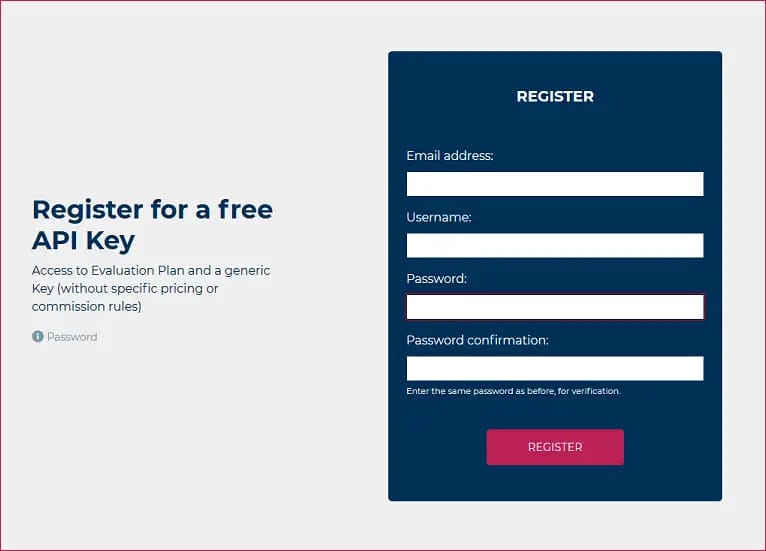
Registration for a free API Key at Hotelbeds.
This straightforward registration process grants you an ID and API Keys for Hotelbeds' three API suites: Hotel, Activities, and Transfers. This quintessential API key serves as the gatekeeper for every request you make to their API.
Credential configuration and authentication. Upon registration, you'll have at your disposal a set of three API Keys, one each for the suites mentioned above.
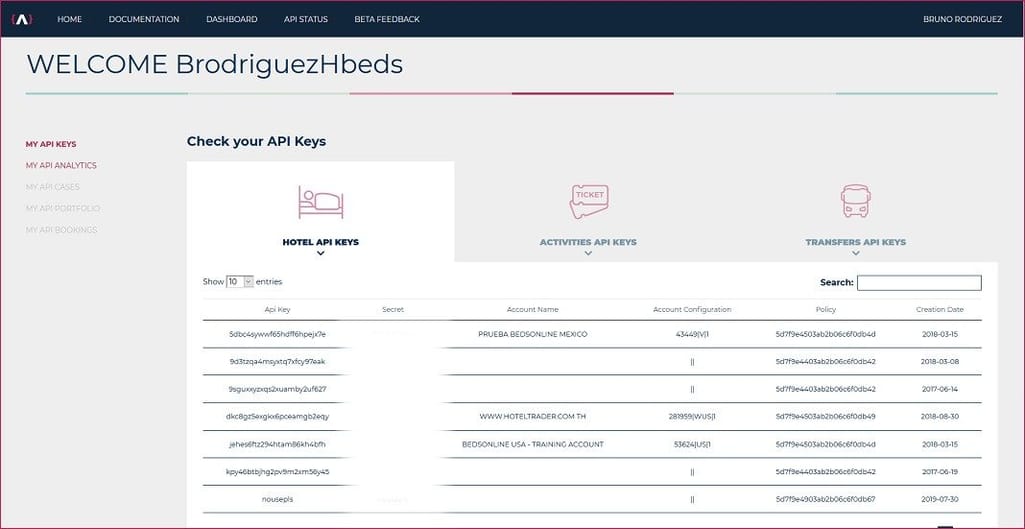
“My API Keys” tab.
These keys can be accessed via your personal dashboard. But simply having the keys isn't enough — proper authentication is required. This involves sending both the API Key and the X-Signature — a SHA256 hash in Hex format. This hash is formulated from a combination of your API key, secret, and the current timestamp in seconds.
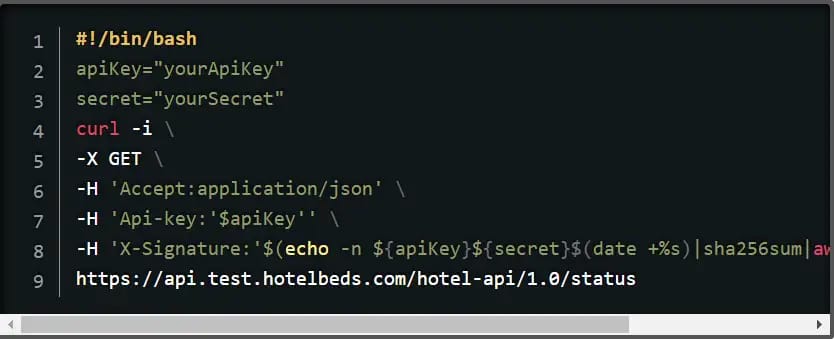
The authentication process.
Initiating API requests for testing. With your credentials set and authentication configured, it's time to commence the testing phase. APItude allows you to test against their endpoint.
Working on the test project for AltexSoft, Oleksandr Gerashchenko points out, “The search for hotels starts with location and dates. The search returns cached results. It might show a particular hotel and rooms with an approximate price. But once you enter a specific hotel, it returns more detailed information about the rooms and prices.”
Oleksandr also mentioned the challenges our team faced with the distinction between production and sandbox modes, particularly the sandbox's limitation of 50 queries per day. It's, however, noteworthy that these test servers mirror their production counterparts. Any booking requests against this test server won't culminate in actual reservations or credit card charges. You might consider leveraging their Swagger specification or Postman collections for your maiden request.
Precisely following these steps ensures a firm foundation for your integration process. The subsequent stages involve further development, refining, and eventual deployment into your system.
Certification: bring your integration to life
Ensuring the quality and reliability of your Hotelbeds integration necessitates rigorous adherence to their certification process. This protocol evaluates integrations on various technical, functional, and operational standards to guarantee an impeccable end-user experience.
Preparatory phase. The preparatory phase mandates following best practices to streamline certification. The focus is on five pivotal areas:
- Technical aspects,
- Workflow,
- Availability with CheckRate and Confirmation,
- Content, and
- both Voucher issuance and Live environment testing.
Initiating the certification. Upon perfecting your integration in line with these pillars, the next step involves reaching out to Hotelbeds. Connect via email atapitude@hotelbeds.com, detailing your workflow, unique approaches for varying distribution channels, commercial choices, certification URL, and other pertinent data.
Technical and workflow review. Probing the specifics, the technical review is dedicated to scrutinizing request configurations and the efficacy of GZIP compression. The workflow segment emphasizes the accuracy and sequence of API calls integral to bookings. Reducing redundancy and ensuring precision is paramount.
Availability, CheckRates, and confirmation. The system must accurately reflect essential availability, CheckRates, and confirmation information. It should facilitate passenger count selection, acknowledge the presence and ages of children, and handle multi-room reservations. Furthermore, adhering to stipulations like using opaque rates, source markets, filters, and cancellation policy displays is crucial.
Content synchronization. Content synchronization with Hotelbeds' ContentAPI is key. Capturing diverse data about hotels ensures the provision of timely and accurate hotel information, images, categories, and facilities.
Voucher issuance. Once there's a confirmed reservation, the system should promptly dispatch a voucher to the end user. This document serves as a booking confirmation and should list everything from hotel details to booking specifics and payment guidelines.
Live environment testing. The final stretch in the certification journey revolves around live environment testing. Real bookings are made to verify and validate the system's effectiveness. It's a twofold test, with the subsequent cancellation acting as another layer of confirmation.
Ensuring compliance throughout this extensive certification process affirms the integrity and robustness of your integration and elevates the user experience, making it seamless and error-free for all potential customers.
Third-party integration considerations
Sometimes, the integration journey with Hotelbeds can be streamlined using aggregator services. These aggregators consolidate multiple APIs, ranging from bed banks like Hotelbeds to other service providers like Booking.com or airlines. One evident advantage of this approach is the ability to tap into numerous suppliers through a single API. It saves time, reduces technical overhead, and eliminates the need to undergo multiple certifications.
At the same time, while the technical integration becomes smoother, businesses still have to engage in individual negotiations with each end provider whose inventory they wish to access.
Olga Ladyk, a Delivery Manager at AltexSoft, reflects on one such experience: "Choosing a third-party aggregator for our Hotelbeds integration was a strategic move. It fast-tracked our project by avoiding certain certification steps. Moreover, including Hotelbeds' services greatly enriched the project, and we received very positive feedback."
When considering this route, especially for travel resellers, understanding both its advantages and challenges is critical. Each aggregator comes with its own operational nuances, and while they might align with your project's tech stack and accelerate development, you must be prepared for unique challenges that might arise from using such services.
Deployment and management
Before unveiling the Hotelbeds integration to your user base, decide on the strategy: Choose a phased introduction to users in stages, or make it available to all users simultaneously. Once deployed, consistently monitor how the integration performs and collect feedback directly from users, especially regarding the features provided by Hotelbeds. The integration should be a living entity, evolving with time. Use the accumulated performance data and user feedback as a roadmap, making necessary refinements and enhancements to the system.
Integrating Hotelbeds API: Key lessons learned
The process of integrating with the Hotelbeds API presents several lessons, many of which become evident only when diving deep into the actual integration. AltexSoft's experience provides a first-hand account of this journey, shedding light on the nuances of the process.
Strategic query planning. While the sandbox environment is a safe space to test integrations, it's essential to use it wisely as there are limitations on excessive queries. Adopting a strategic approach in extracting and storing content is advisable, ensuring you maximize the information retrieved while staying within potential bounds.
In-depth analysis of the documentation. Any integration journey requires a compass; for Hotelbeds API, it's their documentation. Oleksandr Gerashchenko's insights underscore its significance. "Reading the documentation is more than just a routine step; it's the key to a smooth integration," he shared. “This not only offers a pathway but also highlights potential pitfalls, making the process more predictable.”
Local content storage strategy. Storing content locally, especially when dealing with extensive databases like Hotelbeds, is about efficiency and ensuring up-to-date information for users. Oleksandr Gerashchenko relates, “We implemented a separate process that periodically accessed Hotelbeds to extract content. At first, we extracted all the content and stored it in our database. Then, once a day, we checked for any content changes and only extracted those updates.” Periodic updates, instead of querying the database every time, can make the system more responsive and efficient.
Integrating with Hotelbeds API, like any other, is an intricate dance of understanding the tool and marrying it with your system's capabilities. With the above lessons and insights, you can prepare better and execute your integration plans more effectively.
Hotelbeds competitors and alternatives
In the competitive landscape of hotel distribution platforms, Hotelbeds faces stiff competition from several key players. So you can consider the following wholesalers.
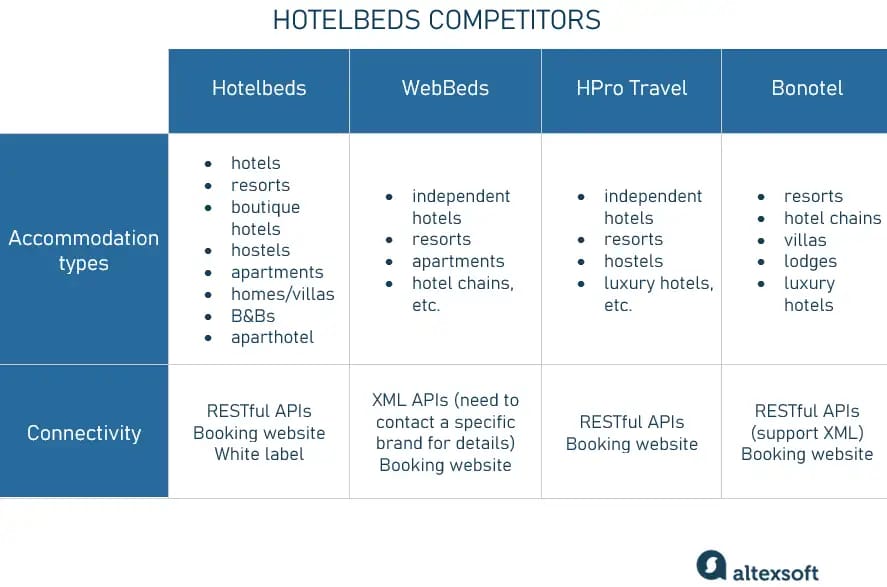
Comparison of wholesaler competitors of Hotelbeds by accommodation and connectivity.
WebBeds by Webjet
Part of the Webjet Limited umbrella, WebBeds has swiftly grown to be the world's second-largest accommodation supplier since its launch in 2013. They have an expansive inventory of over 368,000 properties in more than 170 countries. Catering primarily to travel agents, OTAs, and tour operators, WebBeds boasts a diverse family of regional brands such as JacTravel DMC, Sunhotels, Destinations of the World (DOTW), FIT Ruums, Lots of Hotels (LOH), and Umrah Holidays International (UHI).
While accommodation remains their core strength, they also have ties with over 16,000 suppliers of travel-related services worldwide. Their integration capabilities vary depending on the specific brand within the WebBeds family.
HPro Travel (HotelsPro)
Proclaiming to have the largest inventory portfolio, HPro Travel (previously known as HotelsPro) offers access to 1 million hotels across 205 countries. Predominantly rooted in Europe, they have been making strides in global expansion. Their offerings cater primarily to tour operators and travel agencies, encompassing a variety of accommodation types ranging from budget stays to luxury resorts.
Besides lodging, HPro Travel also provides access to an array of ancillary travel services like airport transfers, car rentals, and diverse tours and activities. Their robust JSON API documentation facilitates seamless third-party integrations.
Bonotel
Focusing on the luxury travel segment, Bonotel Exclusive Travel offers a niche portfolio of upscale properties, primarily in the US, Mexico, and the Caribbean. Although their hotel inventory is comparatively smaller, they pride themselves on their exclusive collaborations with renowned hotel brands such as MGM Resorts International, Four Seasons, and The Ritz-Carlton, to name a few. Their integration capabilities are facilitated through RESTful APIs, supported by XML messaging, which aids in hotel bookings and manages static hotel content.
As with any other technology, it’s a good idea to check all available options to choose the most suitable one for your tasks.
This article belongs to a series showcasing our expertise. For a deeper dive into similar topics, we invite you to explore the related blog posts:
Hotel Price Prediction: Hands-On Experience of ADR Forecasting
Occupancy Rate Prediction: Building an ML Module to Analyze One of the Main Hospitality KPIs
Sabre API Integration: Hands-On Experience with a Leading GDS
Amadeus API Integration: Practice Guide on Getting the GDS Content
Sentiment Analysis in Hotel Reviews: Developing a Decision-Making Assistant for Travelers
Flight Price Predictor: Training Models to Pinpoint the Best Time for Booking
OTA Rates and Building Commission Engine: Best Practices and Lessons Learned
Audio Analysis With Machine Learning: Building AI-Fueled Sound Detection App
Computer Vision in Healthcare: Creating an AI Diagnostic Tool for Medical Image Analysis

